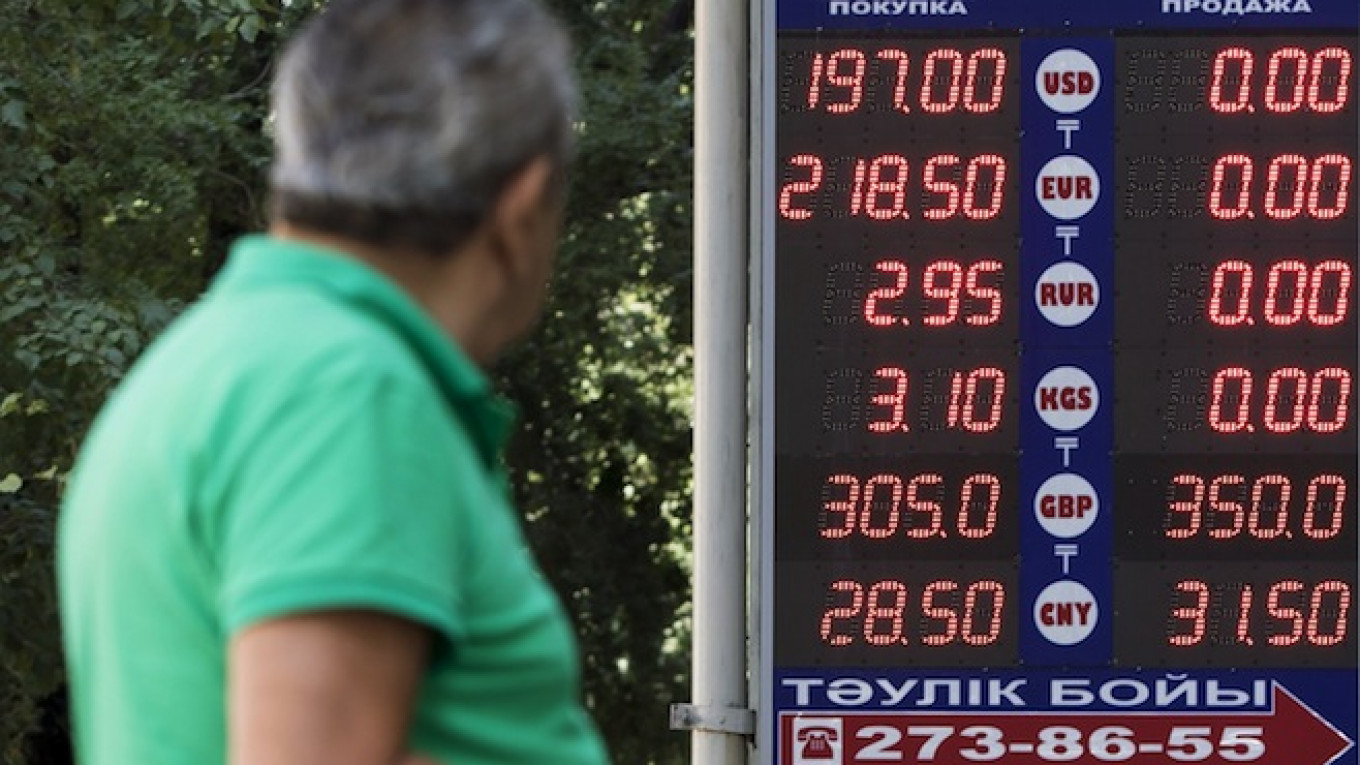The tenge lost more than a quarter of its value on Thursday as Kazakhstan fired the latest salvo in an emerging market currency war, ditching a trading band stretched to breaking point by sharp falls in crude and commodities prices.
Kazakh President Nursultan Nazarbayev said oil-dependent Kazakhstan, which has lost competitiveness to trading rivals during a wave of devaluations and depreciations in the region, had been forced to act.
"No one could have stood aloof from this [currency] storm," he told a meeting of officials and business leaders broadcast on state television, adding that the central bank had spent $28 billion since the start of 2014 defending the tenge.
Prime Minister Karim Masimov said earlier that Kazakhstan would now compete better, "including on the markets of our neighbors," referring to Russia and China, which sent shockwaves through emerging markets last week by devaluing the yuan.
The float was welcomed by Kazakh oil and mining sector firms.
But analysts warned it might prompt similar action by others in the region, and it dismayed ordinary Kazakhs, who have already seen the tenge devalued three times since 1999.
"I am going to a bazaar right now, and the tenge in my wallet are weighing less and less," translator Alexei Chernoussov wrote on his Facebook page. "I don't know if I will buy something before this cash simply evaporates."
Nazarbayev, a strongman who has ruled Kazakhstan virtually unopposed since 1989, said police would crack down on any "provocateurs" who protested against the new policy.
The official tenge rate tumbled by 26.2 percent to 255.26 per dollar on Thursday and exchange offices in the financial capital Almaty said they were selling dollars at 253.
Kazakhstan's central bank most recently devalued the tenge, by 19 percent, in February 2014, and the currency has been under pressure since last year when the ruble of key trade partner Russia collapsed, driven lower by Western sanctions as well as the decline in oil prices.
Kazakhstan, Central Asia's largest economy and No. 2 post-Soviet oil producer after Russia, suffered a 40 percent fall in exports between January and July, said National Economy Minister Yerbolat Dosayev, due to the sharp drop in global oil and commodity prices. Kazakhstan also exports significant quantities of metals.
Imports shank by 20 percent in the same period, he said.
On Wednesday another, smaller trading partner, Vietnam, devalued its dong, and Demetrios Efstathiou, head of CEEMEA Strategy at ICBC Standard Bank in London, said the manat of Caspian Sea neighbor Azerbaijan might be the next domino to fall.
Azerbaijan devalued the manat by 35 percent in February in reaction to low oil prices.
"A [Brent] oil price in the mid-$30s may change the situation however," Efstathiou said, adding energy-hungry neighbor Armenia could let its dram currency lose 10-15 percent in the next three to four months.
A domestic lobby pressing for a weaker tenge had included Kazakh oil and mining sector firms, which were among those that benefited hugely from last year's devaluation.
Shares in London-listed copper miner Kaz Minerals jumped by 19.3 percent. The London-traded stock of KazMunaiGas Exploration Production rose 8.8 percent.
Nazarbayev said prices for Kazakh oil and metals could stay low for another five years.
Central bank governor Kairat Kelimbetov appeared unruffled by Thursday's sharp market-driven drop in the tenge, saying he expected the market would set "a fully balanced rate" in five or seven days.
"This is not a devaluation, this is a transition to a freely floating rate when the market itself determines a balanced exchange rate," he told a news conference broadcast from the capital Astana.
He also said the central bank would no longer intervene massively to influence the tenge rate and the bank and government said the country's economic policy would henceforth be based on inflation targeting.
That brings Kazakhstan's policy more into line with Russia, whose central bank floated the ruble late last year and announced a shift to an inflation-targeting regime, but still periodically reacts to bouts of ruble weakness.
The government may trim its budget spending this year, Masimov said. He said next year the cabinet would not borrow on foreign capital markets to bridge the fiscal gap of the state budget, which would be based on a "conservative scenario" of $40 per barrel oil.
Nazarbayev said the tenge float would allow the central bank to save its reserves, including the "rainy day" National Fund that collects windfall oil export cash and is now worth $69 billion.
"So no one should cast their greedy eyes on that," he said.
A Message from The Moscow Times:
Dear readers,
We are facing unprecedented challenges. Russia's Prosecutor General's Office has designated The Moscow Times as an "undesirable" organization, criminalizing our work and putting our staff at risk of prosecution. This follows our earlier unjust labeling as a "foreign agent."
These actions are direct attempts to silence independent journalism in Russia. The authorities claim our work "discredits the decisions of the Russian leadership." We see things differently: we strive to provide accurate, unbiased reporting on Russia.
We, the journalists of The Moscow Times, refuse to be silenced. But to continue our work, we need your help.
Your support, no matter how small, makes a world of difference. If you can, please support us monthly starting from just $2. It's quick to set up, and every contribution makes a significant impact.
By supporting The Moscow Times, you're defending open, independent journalism in the face of repression. Thank you for standing with us.
Remind me later.






